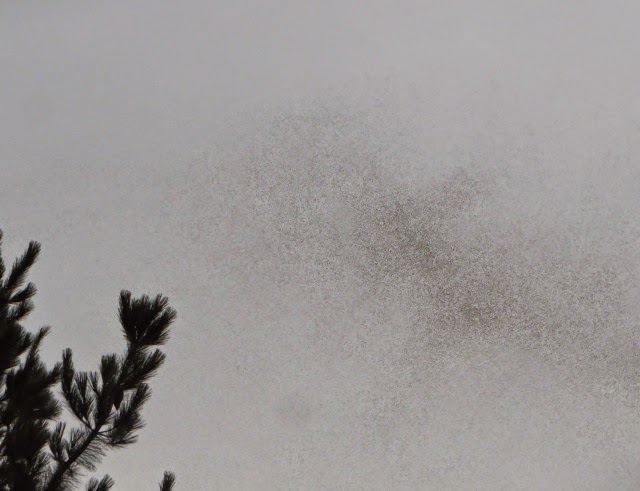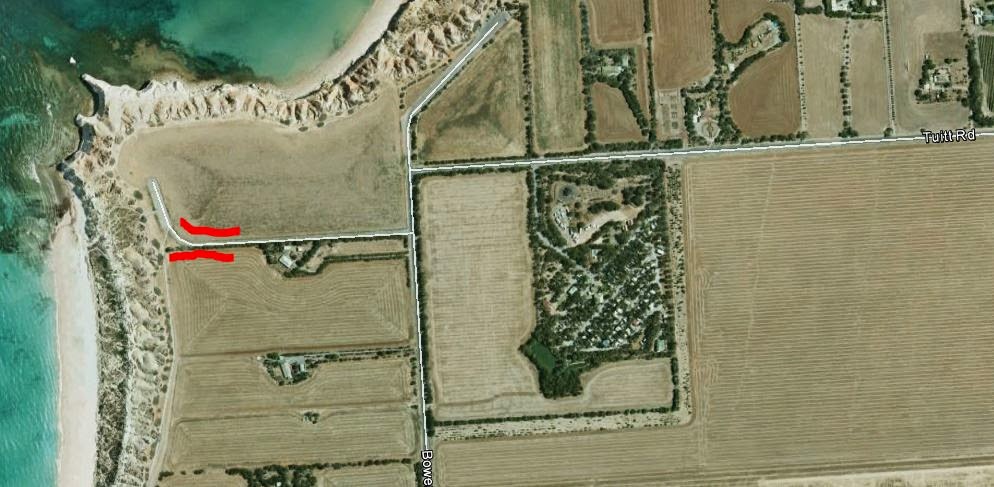Getting rid of a bogey.
I will justify the title of this post with a comment from Sue Taylor's blog:
all to no avail. To make matters worse by the time I got home (wherever that was at the time) there is usually a post to the COG Chatline explaining how the bird had just stolen someone's lunch (or in the cases like Chapman Ridge, breakfast) 5 minutes after I left the area.
So when I saw Maurits Zwankhuizen's post to the COG Chatline yesterday ....
When we got to the National Film and Sound Archive
My attention was immediately grabbed by Noisy Miners making a ruckus at point A. Sure enough ...
.. just like Maurits' experience the miners were mobbing a Grey Currawong. So I carried on to Liversedge St, where some more Miners and an Australian Raven were creating a noise. No sign of a Butcherbird.
So I lapped the Archive building with my usual level of success (in the middle of -1 and +1). When I returned to my start point there was still noise coming from Liversedge St so I cut through some gardens close to the Archive building. A bird landed in an old pine tree at point B, with its back to me: definitely a butcherbird but what sort? Then I saw the front! Bingo! A bogey no more.
A dead tree next to the building seems to have been selected as a des-res by bees and the butcherbird was stooping into the insects and appeared to be taken then for food.
Here is another image: taken because I could!
Following Ian Fraser's comment (see below) I checked the excellent COG Birdinfo page for this species and took this snapshot of the distribution around 'Canberra':
In essence the darker the pink the higher the reporting rate. A dash shows no reports of the species and a grey box means o reports at all for that 2.5" square.
The reporting rate is an interesting shape. I will try to form some hypotheses (OK guesses) about
and
"Most birders have a bogey bird - that's a bird that they've looked for on several occasions, but which continues to elude them. It's sometimes called a 'jinx bird.' "Now I have searched for Pied Butcherbirds within the ACT in at least the following ways:
- Hall Cemetery on several occasions;
- Chapman Ridge at a ridiculously early hour of the morning;
- Mulligan's Flat for many hours including some rather long bike rides to get there;
- Urriara Village on several occasions
all to no avail. To make matters worse by the time I got home (wherever that was at the time) there is usually a post to the COG Chatline explaining how the bird had just stolen someone's lunch (or in the cases like Chapman Ridge, breakfast) 5 minutes after I left the area.
So when I saw Maurits Zwankhuizen's post to the COG Chatline yesterday ....
"Seeing Peter Milburn's posting, I went looking for the Pied Butcherbird yesterday without luck, although Noisy Miner alarm calls did lead me to a Grey Currawong. "I was more fortunate this morning and found the Pied Butcherbird sitting quite openly in the trees right in front of the National Film & Sound Archive. This was around 9:40am.".... I thought here is another nice waste of my time coming up.
When we got to the National Film and Sound Archive
My attention was immediately grabbed by Noisy Miners making a ruckus at point A. Sure enough ...
.. just like Maurits' experience the miners were mobbing a Grey Currawong. So I carried on to Liversedge St, where some more Miners and an Australian Raven were creating a noise. No sign of a Butcherbird.
So I lapped the Archive building with my usual level of success (in the middle of -1 and +1). When I returned to my start point there was still noise coming from Liversedge St so I cut through some gardens close to the Archive building. A bird landed in an old pine tree at point B, with its back to me: definitely a butcherbird but what sort? Then I saw the front! Bingo! A bogey no more.
A dead tree next to the building seems to have been selected as a des-res by bees and the butcherbird was stooping into the insects and appeared to be taken then for food.
Here is another image: taken because I could!
Following Ian Fraser's comment (see below) I checked the excellent COG Birdinfo page for this species and took this snapshot of the distribution around 'Canberra':
In essence the darker the pink the higher the reporting rate. A dash shows no reports of the species and a grey box means o reports at all for that 2.5" square.
The reporting rate is an interesting shape. I will try to form some hypotheses (OK guesses) about
- why the species has increased in the area in several recent years and/or
- why the rate has a couple of drops.
and










Comments
Martin